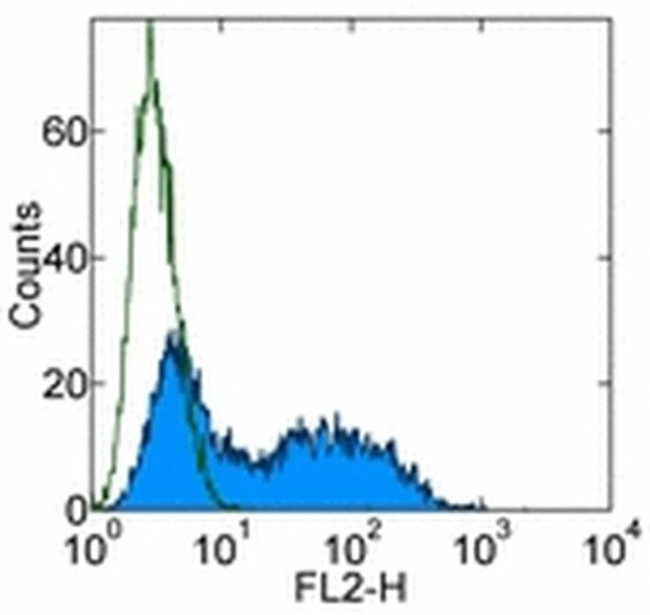Search Thermo Fisher Scientific
Invitrogen
CXCL9 (MIG) Monoclonal Antibody (MIG-2F5.5), PE, eBioscience™
Product Details
12-3009-80
Species Reactivity
Published species
Host/Isotype
Recommended Isotype Control
Class
Type
Clone
Conjugate
Excitation/Emission Max
Form
Concentration
Purification
Storage buffer
Contains
Storage conditions
Shipping conditions
RRID
Product Specific Information
Description: The monoclonal antibody MIG-2F5.5 reacts with mouse monokine induced by IFN gamma (mig, mig-1, CXCL9). This 14.4 kDa inflammatory chemokine is specifically induced by IFN gamma, but not other activators such as LPS or IFN alpha. Secretion of mig, mainly by macrophages results in the chemotaxis of a variety of activated T cells via the CXCR3 chemokine receptor. Mig is involved many areas of research including autoimmune diseases, cancer, and inflammation.
Applications Reported: This MIG-2F5.5 antibody has been reported for use in intracellular staining followed by flow cytometric analysis.
Applications Tested: This MIG-2F5.5 antibody has been tested by intracellular staining followed by flow cytometric analysis of IFN gamma-stimulated thioglycolate-elicited peritoneal exudate cells and RAW 264.7 cells. This can be used at less than or equal to 0.25 µg per test. A test is defined as the amount (µg) of antibody that will stain a cell sample in a final volume of 100 µL. Cell number should be determined empirically but can range from 10^5 to 10^8 cells/test. It is recommended that the antibody be carefully titrated for optimal performance in the assay of interest.
Excitation: 488-561 nm; Emission: 578 nm; Laser: Blue Laser, Green Laser, Yellow-Green Laser.
Filtration: 0.2 µm post-manufacturing filtered.
Target Information
MIG, also known as CXCL9, is a T-cell chemoattractant inducible by gamma interferon that is a member of the CXC chemokine family of cytokines.This gene is mapped to 4q21. It is noted that, although the best-described activities of the chemokines are as chemotactic factors, chemokines also have an effect on T-cell activation, angiogenesis, and HIV infection. While most CXC chemokines are chemotactic for neutrophils, MIG and INP10 are unusual and similar in being CXC chemokines that are chemotactic for lymphocytes and inactive in neutrophils.
For Research Use Only. Not for use in diagnostic procedures. Not for resale without express authorization.
How to use the Panel Builder
Watch the video to learn how to use the Invitrogen Flow Cytometry Panel Builder to build your next flow cytometry panel in 5 easy steps.
Bioinformatics
Protein Aliases: C Cmotif chemokine; C X C motif chemokine; C-X-C motif chemokine 9; CC motif chemokine; CCmotif chemokine; CXC; CXC motif chemokine; CXCL; gamma interferon-induced monokine; Gamma-interferon-induced monokine; M119; MIG; monokine induced by gamma interferon; Monokine induced by interferon-gamma; Protein m119; small inducible cytokine B subfamily (Cys-X-Cys), member 9; Small-inducible cytokine B9
Gene Aliases: BB139920; CMK; crg-10; Cxcl9; Mig; MuMIG; Scyb9
UniProt ID: (Mouse) P18340
Entrez Gene ID: (Mouse) 17329

Performance Guarantee
If an Invitrogen™ antibody doesn't perform as described on our website or datasheet,we'll replace the product at no cost to you, or provide you with a credit for a future purchase.*
Learn more
We're here to help
Get expert recommendations for common problems or connect directly with an on staff expert for technical assistance related to applications, equipment and general product use.
Contact tech support


